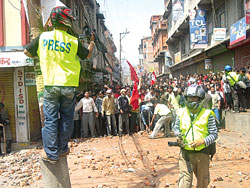|
|
Journalists and their associations in Nepal tend to stress the same abstract ideals of a free press for democracy. Their reasoning goes like this: a free press safeguards democracy, just as democracy safeguards a free press. It's tempting to think that our journalists appear to be fighting to safeguard their own bread and butter concerns under the convenient umbrella of democracy, even when that's not the case. It's time the proponents of free press started using two market-based perspectives to talk about the instrumentalist role that a free press plays in making Nepal's democracy healthier-regardless of who's in power.
Reducing info asymmetry: No investor or buyer takes a company seriously if the information it gets cannot be verified by independent auditors or market analysts. Likewise, neither voters nor visitors can take a government's claims about democracy seriously if a competitive and independent private-sector press appears to have been made unable to verify the information provided by the government.
For example, Nepal's present regime has stuck to a claim that it has formed a legitimate government, which, it says, is accountable to the people. If that's the case, then why doesn't it allow an open audit of its actions? Why does it harass journalists, shut down news programs on FM stations, provide subsidies to a few media houses to buy influence, prop up state media organs with public money to air one-sided views and shut down the phone systems?
True, governments everywhere have their own convoluted reasons for suppressing information. But choosing a democracy means choosing openness, which can only be strengthened if there is a free press constantly subjecting the government's actions to public scrutiny-to correct biases, to expose abuses of power and to bring unpopular viewpoints to the fore. All these reduce the information gap between those who govern and those who are governed.
News as public good: Imagine paying for a service only to receive nothing. Will that make you happy? No. Nepalis pay a variety of taxes to the government. Those who can't pay, authorise the government to accept millions of dollars worth of foreign loans and grants. All expect the money to be used for universal primary education, basic healthcare, infrastructure development and good governance.
When the public pays money for a bundle of governance activities-ranging from security to food distribution-it has an interest to find out what is happening and why. Viewed this way, news about any democratic government's activities is never something private for a few officials on the state's payroll to keep tight about. Such news is a public good to which everyone, by virtue of having paid for it either directly or indirectly, must have access. A free press assures that such a public good does remain in the public domain so that hearings, debates and deliberations can take place to judge, evaluate and reject the government's actions.
Yes, there is always some danger that a free press might falsify news to emphasize its political biases. But such a concern is unfounded for two interrelated reasons: First, in a competitive market, press members face private incentives to monitor one another much more intensely. An aggregation of such private behaviours results in an act of public service so that false news gets corrected quickly. Second, no media outlet can afford to play footloose with the truth for long without damaging its long-term source of revenue: public credibility.
More than abstract democratic ideals, which can be meaningless when borrowed and abused by all, it's the market-based perspectives that help us argue the reasons why we want an absolutely free press in Nepal.




